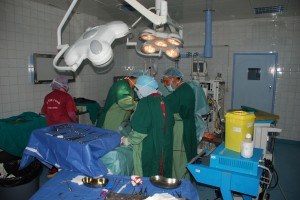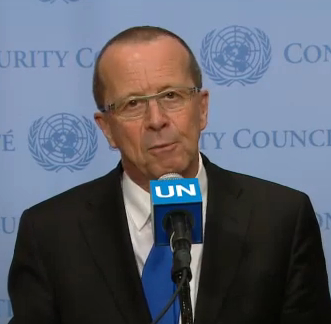By Elmahdi A. Elkhammas,

Columbus, 2 March 2016:
As a surgeon who is a graduate of Libyan medical schools, I am very happy . . .[restrict]to see many ambitious young Libyan doctors coming to the United States seeking residency and higher education. This number is getting larger every year.
Currently there are several hundred young physicians who have arrived with scholarships from the Libyan governments and some with self-funding. In any case, some introduction to the American training system is due. I would like to touch on some points to open the doors for a detailed knowledge.
First of all, the incoming doctors rightfully expect some help from us, the Libyan physicians who reside and practice in the United States of America. They need help with orientation to the American culture, with housing, buying a car, having a cell phone, opening a bank account, and most importantly help with obtaining residency and academic enrolment.
In February of 2012, Libyan physicians had launched the Libyan Healthcare Society-USA. The society has done several seminars online that covered medical, surgical, as well as training topics. We will be happy to offer our assistance as much as we can.
Most have a good grasp of the English language and have researched their move to the United States. Others learn from colleagues after their arrival.
However, there are so many doctors who were shocked upon arriving here at the amount of regulation that is required, and the need to pass qualifying examinations to become eligible for residency. These are facts and each medical student coming to the USA for graduate studies must be aware of.
All international medical graduates must pass certain qualifying medical examinations prior to acceptance to training programs in the United States. Some Libyan doctors have asked why there is a need for such examinations. Their desire is to obtain training and return to their beloved country. They also say that they do not wish to practice medicine in the United States; and most plan to return home as soon as they finish training.
However, rules are rule. There are several entities that are involved in medical and surgical training. Graduate medical education, state medical boards, Medicare, educational commission for foreign medical graduates (ECFMG) (http://www.ecfmg.org/certification/), and the different specialty boards all have requirements to meet.
For any medical graduate, an educational license is needed to start residency in any teaching hospital. Passing the different parts of the USMLE ( http://www.usmle.org) is necessary to obtain that license. Finishing training in a good standing training program is necessary to take the specialty board examination and become a board certified physician.
General Surgery
The ECFMG is the governing body that deals with international medical graduate certification to allow those physicians to obtain the needed documentation to start training with educational state license. The following information is the first step in understanding the process.
There are many medical and surgical specialties available for a clinical career. I will mention general surgery and internal medicine as examples.
In the United States, the minimum training period for general surgery is five years. A young doctor from Libya may come to the United States with the hope that he/she will start immediately. Reality shows the road is long and full of hurdles. This real road is as follows.
The candidate may take some English courses, or for the best scenario the young physicians will begin Kaplan medical courses to review material necessary to pass the USMLE.
This is a broad overview of the material the medical student has studied in medical school. So if the Libyan graduate has finished medical school four to five years ago, the candidate will need to warm up to sitting for 10-12 hours a day studying this material.
Once he/she feels ready to take the test, the exam is scheduled. Usually one must wait for several weeks before receiving test results. In any case the three exams are needed before one is considered for the match:
- USMLE1
- USMLE2 which is two parts (2. CK = clinical knowledge and 3. CS = clinical skills).
Once the physician passes the required examination, then and only then is that physician ready to apply for residency. ERAS then come into the picture: The Electronic Residency Application Service (ERAS®) (https://www.aamc.org/services/eras/).
ERAS have a cut-off date for filing the application as well as expenses involved. Potential residents need to familiarize themselves with this service. Usually it is in the second half of the calendar year.
The physician must apply to the different programs via ERAS and wait for replies to find out who will offer an interview. The interview process goes from November to early February.
If the physician is lucky, they will have several interviews, then at the end, candidates can rank the programs and wait for the match results (National Resident Matching Program) (http://www.nrmp.org)
No one can guarantee the match outcome. The match service examines the wishes of the applicants against the wishes of the programs and produces a list of the individuals and their posts. Both individuals and programs respect and abide by that list.
The list is usually produced by the middle of March every year. It usually takes one to two years to finish the examination and the matching process.
In the United States the academic year starts on July first every year. So, the residency training starts July first with orientation of two weeks prior to that date, and the training year ends on June 30 each year.
In the United States, general surgery forms the core of training for most of the other surgical specialties. After you finish general surgery you have the choice of cardiac and thoracic surgery, trauma, critical care, minimal invasive, colorectal, vascular, transplant surgery and surgical oncology fellowships to mention a few. The fellowships usually range between one and three years.
Urology, orthopedic surgery, neurosurgery, and plastic surgery have their own programs and match from the start.
Internal Medicine
Physicians for internal medicine follow essentially the same steps as for general surgery. The length of training is three years. Then they can decide if there is a desire to enter a fellowship in one of the medical subspecialties. Pulmonary and critical care, cardiology, gastroenterology, nephrology, transplant nephrology are all examples of such fellowships. These are usually about three years in length.
This is a simple overview of the process and I hope others may add to it so the process becomes clearer to our young doctors.
Having said that, I can think of the following points as basis to help and guide our colleagues who came to the United States for residency and higher education:
- As consultants in the United States, we should work hard to establish observership programs to accommodate serious young doctors. Observerships help by orienting the potential applicant to the American health system and patient care. It also gives the potential applicant a chance to interact with American physicians and observe doctor-patient relationships as well as doctor-doctor relationships.
- As consultants, we should make ourselves available to speak to these young physicians and advise them about the process.
- As consultants, we can help with structuring personal statements and curriculum vitae. We all know that both are important for the quality of the application.
- Helping to secure an interview or a residency spot would be great. The latter is difficult in most cases.
- It is expected that as members of the Libyan Healthcare Society we will assist these young doctors by attempting to answer their questions to the best of our knowledge and minimize their anxiety.
These are just a few ideas. I hope others may add to this and continue to help advancing the career of these young, new, Libyan doctors. I hope the best for all of you.
Dr Elmahdi A. Elkhammas MD is Professor of Clinical Surgery Division of Transplantation at Wexner Medical Centre, Ohio State University Columbus, Ohio. Dr. Elkhammas is very involved in medical ethical and medical education. He has published more than 120 journal articles, book chapters and editorials. He has written several news paper articles in English and Arabic. He is currently Chief of Staff, University Hospital, the Ohio State University Wexner Medical Center. He is a cofounder of the Libyan Healthcare Society-USA.
[/restrict]








